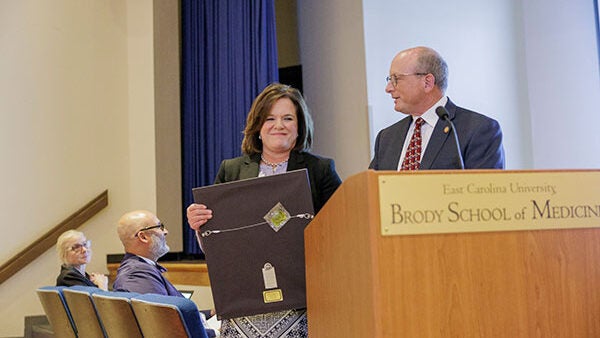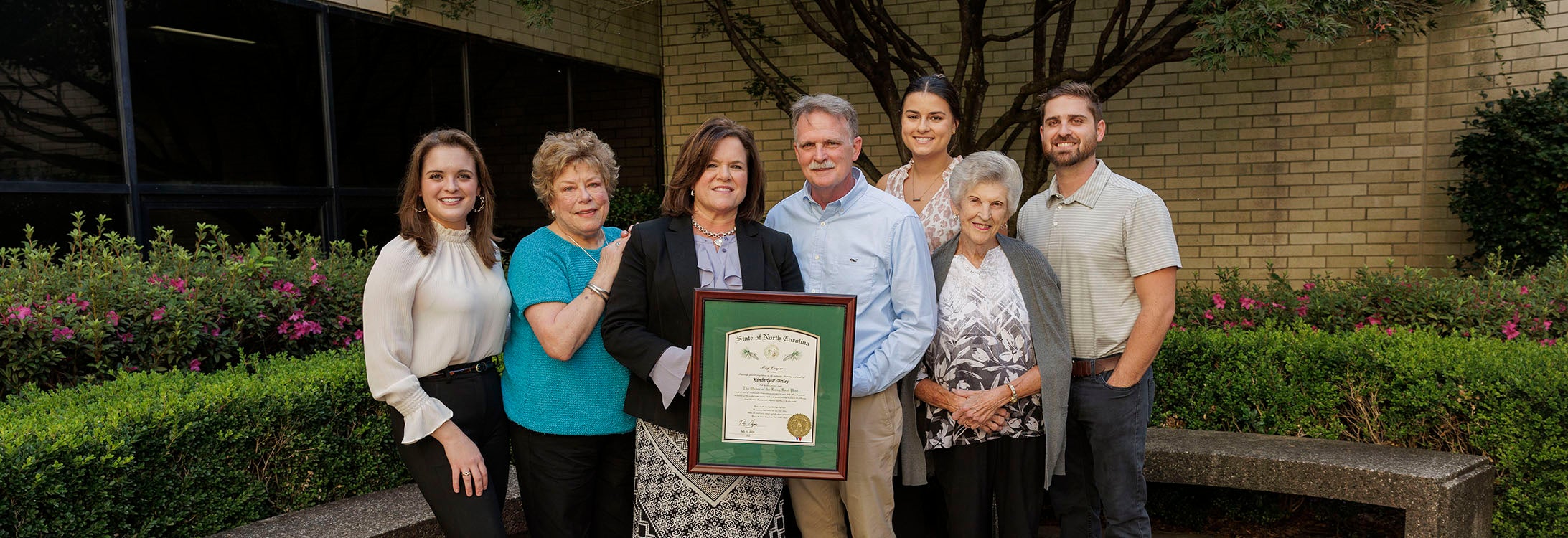ECU medical school researcher named to Order of the Long Leaf Pine
Kimberly Briley spent 35 years serving the Brody School of Medicine at East Carolina University — and has never been able to see herself anywhere else.
Briley, who retired in August, was awarded a place in North Carolina’s Order of the Long Leaf Pine Society. Since 1963, the state’s governors have reserved this highest honor for North Carolinians who have made significant contributions to the state and their communities through their exemplary service and exceptional accomplishments.
Briley’s entire career was spent in Brody’s Department of Pathology and Lab Medicine.
“I continually think of all the wonderful people that I have worked with at ECU as well as in the hospital for the past 35 years,” Briley said. “I feel that this award is not just for me, but for them as well, because we all had one goal — to serve the patients of eastern North Carolina — and perform impactful research that could better their lives.”
Briley was honored during the Sept. 19 Brody faculty meeting by N.C. Rep. Dr. Tim Reeder, who presented the award.
“She’s worked on numerous studies and initiatives which have contributed to the body of knowledge that Brody embodies and informs and impacts what we’ve done throughout the state,” Reeder said.

Briley was presented the Order of the Long Leaf Pine award by N.C. State Representative Dr. Tim Reeder in September.
Briley began at Brody in 1989 as a medical laboratory technologist in the clinical toxicology lab and filled the same position in the clinical chemistry research unit from 1992-2001. In September of 2001, she began working in the Transplant Immunology Lab as a clinical research specialist where she performed clinical studies with renal transplant patients and remained there until retirement. In 2020, Briley also served as clinical research coordinator for the Brody Integrative Genomics Core Lab where she helped with all logistics involved in testing COVID samples for variants for the state and region and worked directly with ECU Student Health to perform COVID testing on saliva samples of ECU students.
“Kim Briley being recognized with the Order of the Long Leaf Pine is yet another example of the dedication of the Brody faculty, staff and students to making North Carolina better every day through research, scholarship, service and teaching,” said Dr. Jason Higginson, executive dean of Brody.
Briley was nominated for the award by the Brody Office of Faculty Affairs and Leadership Development (OFALD).
“She was an obvious choice for this prestigious award because her tireless service to the Brody School of Medicine and her dedication to its mission for 35 years epitomizes a significant contribution to both eastern North Carolina and the entire state,” said Coleman Hinson, OFALD programming coordinator.
“To be nominated means more than anyone will ever know,” Briley said. “I truly loved all aspects of my job and felt like each and every project made a difference in the lives of the patients who trusted us when they agreed to participate. I wanted to be a part of seeing each study through, each one invigorating me time after time. Being recognized with this award is very humbling, but also made my heart so full to know that someone felt that my work and dedication was worthy even to be considered for an award as prestigious as the Order of The Long Leaf Pine.”
Briley’s area and approach to research gave her a unique perspective on how the work affected patients.
“I was truly fortunate in my career to be able to work with multiple teams with different areas of research interests, each one allowing me to perform the research, but also to have patient contact with the research subjects,” she said. “After meeting patients and explaining our goals in gaining their consent to participate, it puts a face with the work. I always felt a tremendous sense of duty to our patients and research participants as well as a great sense of pride when we had successful findings that helped either these patients directly, or those in the future.”
Some of the studies Briley helped lead include: evaluating methods of quantitating bilirubin levels through the skin of jaundiced babies in hopes of eliminating heel sticks; validation and implementation of cardiac markers for patients suspected of having heart attacks; working on multiple studies to detect early markers of rejection in kidney transplant patients, and developing protocols to prevent or halt rejection before damaging the transplanted kidney; validating blood warming devices to be used in the field by the military when emergent transfusion is required; DNA sequencing of COVID-19 swabs for the identification of regional variants to inform physicians and epidemiologist of trends and variants; and, collecting and testing saliva and wastewater samples for COVID-19 in residence halls to help reduce cases and allow ECU to remain open during the pandemic.
Briley said her contributions counted because of the talents and experiences of all those involved.
“All these studies did have an impact on patient care in our area, and as with the COVID projects, also on our state,” she said. “This team of the physicians, research faculty, nurses, lab technologists, phlebotomists, social workers, residents, facilities maintenance, administration and housekeepers was absolutely essential in the success of the research in which I was involved. In research and in medicine, one quickly learns that it takes an entire team to move the needle on a project, and I have been so fortunate to work with so many great teams in my career.”
Briley said some other highlights of her career include her work during the COVID-19 pandemic.
“I would probably say that I am proudest of my role as the coordinator of the Brody Integrative Genomics Core Laboratory, and the work our little team performed during the pandemic,” she said. “Knowledge about this virus was so limited early in the pandemic, and our team was able to contribute to the collective body of knowledge that was emerging by setting up a new state-of-the-art genomics lab, procuring supplies to run the lab during a worldwide shortage, validating and implementing testing shortly after the pandemic started, and yielding results with remarkable turnaround times.”
The Brody team, Briley said, completed 20,000 sequencing tests for coronavirus variants out of the 50,000 performed in total for the state.
“The sequencing data we collected was also used to evaluate patient outcomes, including immunocompromised patients such as our transplant and cancer patients, which led to several other retrospective clinical studies looking at vaccinations and antibody responses,” she said. “We knew that it was so important to uncover data needed to protect the people in our community, the patients in our hospital and the students at ECU.”
In addition to her research achievements, Briley also values her interaction with patients and their willingness to help those who come after them.
“I always shared with them that our research may have findings that would not necessarily help them, but would help others,” she said. “I never had any patient not agree to be in our studies, and they would often grab me in clinic or the hospital hallways to tell me how proud they were to be in a study that sounded so wonderful and could help others with the same medical problems they were dealing with. Meeting the people who are directly impacted by our research, and whose participation in research that may have helped so many others, added so much depth to a project that I already cared so much about.”
Receiving the Order of the Long Leaf Pine award has been a pleasantly surprising finish to Briley’s career, she said.
“I still find it so hard to believe that I am receiving this award in recognition for doing a job that I loved dearly and collaborating with people and patients that filled my cup daily,” she said. “As we say often in my home, ‘My cup runneth over.’”
